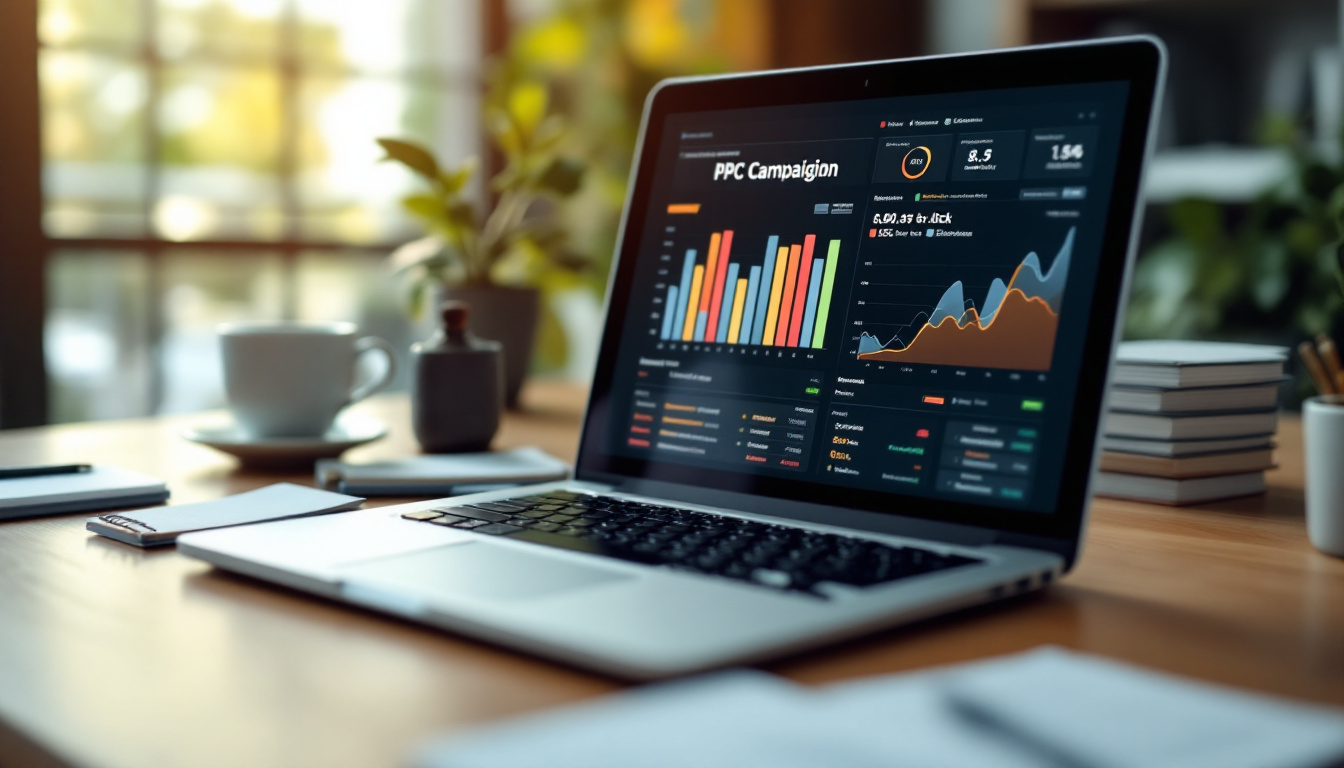The Beginner's Guide to PPC Advertising in San Jose, CA

Pay-Per-Click (PPC) advertising is a powerful digital marketing strategy that can help businesses in San Jose, California, reach their target audience effectively. This guide will walk you through the essentials of PPC, its significance for local businesses, and how to set up and optimize your campaigns for maximum success.
What is PPC and how does it work?
PPC, or Pay-Per-Click, is an internet advertising model used to direct traffic to websites, where advertisers pay a fee each time their ad is clicked. Essentially, it’s a way of buying visits to your site rather than attempting to “earn” those visits organically. The most common form of PPC is search engine advertising, particularly on platforms like Google Ads.

The way PPC works is relatively straightforward. Advertisers create ads and bid on specific keywords relevant to their business. When users search for these keywords, the search engine displays the ads alongside the organic search results. Advertisers are charged only when a user clicks on their ad, hence the name “pay-per-click.”
How Ads Are Displayed
The positioning of your ad largely depends on your bid amount and quality score, which is influenced by the ad’s relevance and the click-through rate. Google utilizes a complex algorithm to determine which ads to display based on various factors, including bidding strategy, ad quality, and the relevance of landing pages. This means that simply having a high bid does not guarantee a top position; advertisers must also ensure that their ads are compelling and relevant to the user's search intent.
Moreover, ads can appear in various formats, such as text ads, display ads, or shopping ads, each designed to engage users differently. Text ads typically consist of a headline, a display URL, and a description, while display ads can include images and videos, making them visually appealing. The effectiveness of these ads often hinges on A/B testing, where different versions of an ad are tested to see which performs better in terms of clicks and conversions.
PPC Platforms
While Google Ads is the most popular PPC platform, there are several other platforms like Bing Ads, Facebook Ads, and LinkedIn Ads that can also be effective, depending on your business goals and target audience. Each platform offers unique targeting options and ad formats, making it essential to understand where your audience spends their time online. For instance, Facebook Ads allow advertisers to target users based on their interests, demographics, and behaviors, which can lead to highly personalized advertising experiences.
Additionally, LinkedIn Ads are particularly beneficial for B2B companies, as they allow advertisers to reach professionals based on their job title, industry, and company size. This specificity can lead to higher conversion rates for businesses looking to connect with other businesses. As digital advertising continues to evolve, staying updated on the latest trends and features of these platforms is crucial for maximizing the effectiveness of your PPC campaigns.
Why PPC is ideal for businesses in San Jose, CA
San Jose, often seen as the heart of Silicon Valley, is home to a diverse array of businesses ranging from tech startups to established corporations. The city's competitive marketplace makes PPC advertising particularly beneficial for gaining visibility in this bustling environment.
One of the main advantages of PPC is its ability to target specific demographics and locations. Businesses can tailor their ads to reach local audiences effectively, ensuring that their marketing messages are seen by those most likely to convert. This localized targeting is essential for small to medium-sized businesses vying for attention in a dense and competitive scene. Additionally, the ability to adjust campaigns based on real-time data allows businesses to respond quickly to market changes, ensuring they remain relevant and appealing to their target audience.
Immediate Results
Another reason PPC is ideal for San Jose businesses is the immediacy of results. Unlike SEO strategies that may take weeks or months to yield results, a well-executed PPC campaign can start generating traffic and leads almost instantly. This rapid turnaround is particularly advantageous for product launches or time-sensitive promotions. Furthermore, the flexibility of PPC allows businesses to experiment with different ad formats and messaging, optimizing their approach based on immediate feedback. This adaptability can be crucial in a fast-paced environment like San Jose, where trends can shift overnight.
Measurable ROI
PPC also offers clear and measurable return on investment (ROI). Businesses can track every aspect of their campaigns, from clicks to conversions, allowing for real-time adjustments and optimizations. This data-driven approach means you can be highly strategic with your marketing dollars and continuously improve your campaigns. Moreover, the insights gained from PPC analytics can inform broader marketing strategies, helping businesses understand customer behavior and preferences. This level of granularity not only enhances the effectiveness of current campaigns but also lays the groundwork for future marketing initiatives, ensuring sustained growth and engagement.
In addition to these benefits, PPC advertising in San Jose provides an opportunity for businesses to stand out in a saturated market. With the right keywords and compelling ad copy, companies can capture the attention of potential customers who may not have been aware of their offerings. The competitive landscape of Silicon Valley means that even small businesses can leverage PPC to compete with larger corporations, leveling the playing field and allowing for innovative marketing strategies that can lead to significant market share.
How to set up a PPC campaign step-by-step
Establishing a successful PPC campaign involves several key steps that require careful planning and execution. Here is a structured approach to setting up your PPC campaign effectively:
- Define Your Goals: Start by setting clear, measurable objectives. Are you looking to increase website traffic, generate leads, or boost sales?
- Keyword Research: Use tools like Google’s Keyword Planner to identify the keywords that potential customers might use to find your products or services. Focus on long-tail keywords for more relevant traffic.
- Choose a PPC Platform: Decide which platform aligns best with your goals and target audience. Google Ads is often a preferred choice due to its extensive reach.
- Create Compelling Ads: Write persuasive ad copy that addresses your audience’s pain points. Highlight unique selling propositions and include a strong call-to-action.
- Set Your Budget: Determine how much you are willing to spend on your PPC campaign. Advertisers can choose between daily or monthly budgets, allowing for control over overall spend.
- Launch Your Campaign: After all settings are finalized and your ads are designed, launch your campaign and begin monitoring its performance.
- Optimize: Analyze performance metrics regularly to see what works and what doesn’t. Adjust bids, tweak ad copy, and refine targeting as necessary.
Once your campaign is live, it’s crucial to keep a close eye on the performance metrics. Key performance indicators (KPIs) such as click-through rates (CTR), conversion rates, and cost per acquisition (CPA) will provide valuable insights into how well your ads are resonating with your target audience. Regularly reviewing these metrics allows you to make informed decisions about where to allocate your budget and which keywords or ads may need to be paused or adjusted. Additionally, consider A/B testing different ad variations to determine which elements drive the best results.
Furthermore, leveraging remarketing strategies can significantly enhance the effectiveness of your PPC campaigns. By targeting users who have previously interacted with your website but did not convert, you can re-engage potential customers with tailored ads that remind them of your offerings. This approach not only increases brand visibility but also improves the chances of conversion, as these users are already familiar with your brand. Integrating remarketing into your overall PPC strategy can lead to higher ROI and better customer retention.
Tips for choosing the right PPC keywords
Keyword selection is a critical component of a successful PPC campaign. Here are some practical tips to help you choose the right keywords for your ads:
- Consider Intent: Focus on keywords that match user intent. Think about what potential customers are searching for and ensure your ads align with those queries.
- Utilize Negative Keywords: Implement negative keywords to prevent your ads from displaying for irrelevant searches. This tactic saves money and improves ad relevance.
- Analyze Competitors: Examine the keywords that competitors use. Tools such as SEMrush or Ahrefs can provide insights into your competition’s strategy.
- Monitor Trends: Stay updated with industry trends and seasonal changes that may affect keyword performance. Keywords can change in popularity over time, so adaptability is essential.
How to track and measure success in PPC
Tracking and measuring the success of your PPC campaigns is vital for understanding their impact on your business. Here are some key metrics to monitor:

- Click-Through Rate (CTR): This metric indicates how well your ads are attracting clicks. A higher CTR suggests that your ads resonate with the audience.
- Conversion Rate: This reflects the percentage of users who complete a desired action after clicking on your ad. Improving this metric can lead to more effective use of your ad spend.
- Cost Per Acquisition (CPA): CPA measures how much it costs to acquire a new customer through your PPC efforts. Keeping this number low is crucial for profitability.
- Quality Score: Google assigns a quality score to your keywords based on relevance and performance. A higher quality score can lead to better ad placements at lower costs.
Utilizing tracking tools such as Google Analytics in conjunction with Google Ads will provide a comprehensive view of your campaigns’ effectiveness. By analyzing the data, you can make informed decisions to optimize your PPC strategy.
In conclusion, PPC advertising can be an effective tool for businesses in San Jose, CA, to enhance their visibility and attract new customers. By understanding its mechanics, setting up a well-structured campaign, and continuously optimizing based on performance metrics, you can achieve significant growth and success in your digital marketing efforts.

As a Google Ads expert, I bring proven expertise in optimizing advertising campaigns to maximize ROI.
I specialize in sharing advanced strategies and targeted tips to refine Google Ads campaign management.
Committed to staying ahead of the latest trends and algorithms, I ensure that my clients receive cutting-edge solutions.
My passion for digital marketing and my ability to interpret data for strategic insights enable me to offer high-level consulting that aims to exceed expectations.